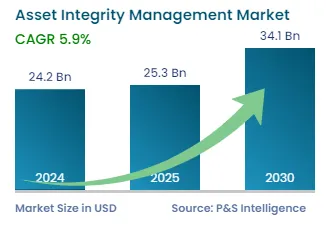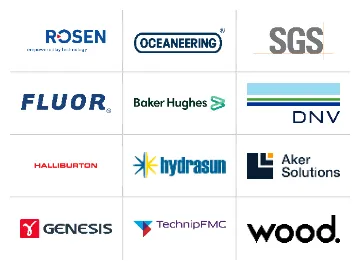Asset Integrity Management Market Future Prospects
The asset integrity management market will generate revenue of an estimated USD 24.2 billion in 2024, and it is expected to witness a CAGR of 5.9% during 2024–2030, to reach USD 34.1 billion by 2030.
The biggest drivers for the market are the rampant industrialization and urbanization around the world, stringent regulations for workplace safety, strong environmental concerns over inadequately maintained industrial assets, and technological advancements across end-use sectors. Additionally, the technologies and methodologies used to dispense asset integrity management services are themselves enhancing with time.
The demand to maintain aging assets is rising, especially in risk-based industries. As the age of infrastructure and equipment increases, they could break down, presenting dangers to operational reliability and worker safety. Asset integrity management helps reduce present and future risks and ensures regulatory compliance in several industries, such as oil & gas, power generation, and petrochemicals. These services are majorly required for assets that operate under harsh conditions, such as boilers, generators, freezers, pipelines, and high-pressure vessels.
Extending asset lifespan and optimizing performance necessitate leveraging risk-based approaches to prioritize resources, interventions based on asset criticality and potential failure modes, and proactive maintenance strategies. As businesses are working on maximizing asset value, enhancing safety, and minimizing downtime, they need to increase the focus on maintaining the aging assets.
The players in the market carry out processes that ensure the safety, reliability, and performance of industrial assets throughout their lifecycle. The main objective behind it is maintaining stakeholder value, maximizing return on assets, and minimizing the risks to business associated with accidents and loss of production.
An asset that can serve its purpose efficiently for a long time, while safeguarding the environment, is the purpose behind asset integrity management. The process involves several technologies and practices aimed at assessing, maintaining, and monitoring assets, to prevent failures, reduce downtime, and guarantee adherence to rules.



